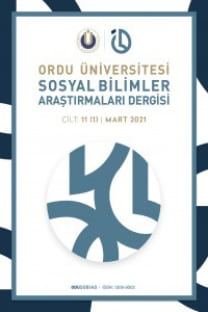Übey B. Ka‘b’ın Kıraat İlmindeki Yeri Ve Ona Atfedilen Kıraatlerin İncelenmesi
The Place of Ubay b. Qa’b in Recitation and the Examination of the Qıraat Attributed to Him
Qur'an, , Recitation, , Companions, , Qurra, ,
___
- Atik, M. K. (1987). “Übey b. Ka‘b ve Kur’an İlimlerindeki Yeri”, Kayseri: Erciyes Üniversitesi İlahiyat Fakültesi Dergisi.
- Begavî, E. M. H. M. (1409). Me‘âlimu’t-tenzîl. Riyâd: Dâru Teybe.
- Bennâ, A. M. D. (2011). İthâfu fudalâi’l-beşer fi’l- kırââti’l-erbeate aşer. Beyrût: Dâru’l-Kütübi’l-İlmiyye.
- Ebû Hayyân, M. Y. E. (1993). Tefsîru’l-bahri’l-muhît. Beyrût: Dâru’l-Kütübi’l-İlmiyye.
- Erul, B. (2012). “Übey b. Ka‘b”, Türkiye Diyanet Vakfı İslam Ansiklopedisi. c. 42. İstanbul: Türkiye Diyanet Vakfı Yayınları.
- Ferrâ, E. Z. Y. Z. (1983). Me‘âni’l-Kur’ân, Beyrût: ‘Âlemü’l-Kütüb.
- İbn Cinnî, E. F. O. C. M. (1994). el-Muhteseb fî tebyîni vücûhi şevâzzi’l-kırâât ve’l-îzâhi anhâ. Kahire: Meclisü’l-A’lâ li’ş-Şuuni’l-İslâmiyye.
- İbn Ebî Dâvûd, E. B. A. S. (1415/1995). Kitâbü’l-Mesâhif. Beyrut: Dârü’l-Beşâiri’l-İslâmiyye.
- İbn Hacer el-‘Askalânî, A. A. (1415/1995). el-İsâbe fî temyîzi’s-sahâbe. Beyrut: Darü’l-Kütübi’l-İlmiyye.
- İbn Hâleveyh, E. A. H. A. (t.y.). Muhtasar fî şevâzzi’l-Kur’ân min kitâbi’l-bedî‘. Kahire: Mektebetü’l-Mütenebbî.
- İbn Mücâhid, E. B. A. M. A. (1119). Kitâbü’s-seb‘ fi’l-kırâât. Kahire: Dâru’l-Meârif.
- İbnü’l-Cezerî, E. H. Ş. M. M. A. Y. (2006). Ğâyetü’n-nihâye fî tabakâti’l-kurrâ. Beyrut: Dâru’l-Kütübi’l-İlmiyye.
- İbnü’l-Cezerî, E. H. Ş. M. M. A. Y. (t.y.). en-Neşr fî’l- kırââti’l-aşr. Beyrût: Dâru’l-Kütübi’l-İlmiyye.
- Karakuş, A. (1999). “Übey b. Ka‘b, İlmi Şahsiyeti, Kıraati ve Tefsirdeki Metodu”. Konya: Selçuk Üniversitesi Sosyal Bilimler Enstitüsü.
- Kirmânî, E. A. M. E. N. (t.y.). Şevâzzü’l-kırâât. Beyrût: Müessesetü’l-Belâğ.
- Kurtubî, E. A. M. A. E. B. (2006). el-Câmi‘ li-ahkâmi’l-Kur’ân ve’l-mübeyîn limâ tedammenehû mine’s-sünneti ve âyi’l-Furkân. Beyrût: Müessesetü’r-Risâle.
- Mâtürîdî, E. M. M. M. (1426/2005). Te’vîlâtü ehli’s-sünne. Beyrut: Darü’l-kütübi’l-ilmiyye.
- Nehhâs, E. C. A. M. İ. (2008), İ‘râbü’l-Kur’ân. Beyrût: Dârü’l-Ma’rife.
- Râzî, E. A. F. M. Ö. (1981). Mefâtîhu’l-ğayb. Lübnan: Dârü’l-Fikr.
- Suyûtî, C. A. E. B. (1426). el-İtkân fî ulûmi’l-Kur’ân. Medine: Merkezü’d-Diraseti’l-Kur’âniyye.
- Taberî, E. C. C. M. C. (2001). Câmi‘u’l-beyân ‘an te’vîli âyi’l-Kur’ân. Kahire: Dâru’l-hicr.
- Zeccâc, E. İ. İ. S. S, (1408/1998). Me‘âni’l-Kur’ân ve i‘râbüh. Beyrût: Âlemü’l-kütüb.
- Zehebî, E. A. Ş. M. A. O. (1995). Ma‘rifetü’l-kurrâi’l-kibâr ale’t-tabakât ve’l-âsâr, İstanbul: Türkiye Diyanet Vakfı İslâm Araştırmaları Merkezi.
- Zehebî, E. A. Ş. M. A. O. (1402/1982). Siyeru a’lemi’n-nübelâ. Beyrût: Müessesetu’r-Risâle.
- Zemahşerî, E. K. C. M. Ö. A. (1998). el-Keşşâf ‘an hâkâiki ğavâmizi’t-tenzîl ve ‘uyûni’l-ekâvîl fî vücûhi’t-te’vîl. Riyâd: Mektebetü’l-Ubeykân.
- Zührî, E. A. M. S. M. (1421/2001). Kitâbu’t-tabakâti’l-kebîr. Kahire: Mektebetü’l-Hancî.
- ISSN: 1309-9302
- Yayın Aralığı: 4
- Başlangıç: 2010
- Yayıncı: -
Toplumsal Hareketlerin Katalizörü Olarak Futbol: Çarşı ve Ahlavi Örneği
Sosyal Medyada Z Kuşağına Yönelik Nefret Söylemi: Ekşi Sözlük Örneği
Hilal Özlem ABUŞOĞLU, Bahar BALCI AYDOĞAN
Fransa’ya Mülteci Akını, Victor Hugo Kampı’nda Rus Mülteciler ve Fransızların Mülteci Ruslara Bakışı
Aşk Mesnevilerinde (15 ve 16. Yüzyıl) Sırdaş Tipi
Ben Olabilme Üzerine Genel Bir Bakış
Kadın Aşçıların Cam Tavan Sendromuna Yönelik Metaforik Algıları Üzerine Bir Değerlendirme
Lisansüstü Öğrencilerinin Kendini Yönetme Becerilerine Yönelik Nitel Bir Araştırma
Yusuf ESMER, Ayşe Nihan ARIBAŞ
Sınıf Öğretmenlerinin Çeşitli Öğretim Yöntem ve Tekniklerini Kullanma Durumları
